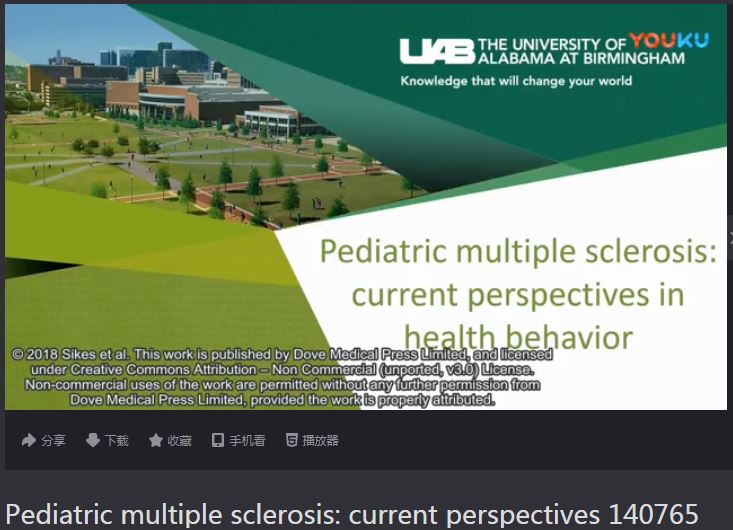9 0 5 7 8
论文已发表
注册即可获取德孚的最新动态
IF 收录期刊
- 2.6 Breast Cancer (Dove Med Press)
- 3.9 Clin Epidemiol
- 3.3 Cancer Manag Res
- 3.9 Infect Drug Resist
- 3.6 Clin Interv Aging
- 4.8 Drug Des Dev Ther
- 2.8 Int J Chronic Obstr
- 8.0 Int J Nanomed
- 2.3 Int J Women's Health
- 3.2 Neuropsych Dis Treat
- 4.0 OncoTargets Ther
- 2.2 Patient Prefer Adher
- 2.8 Ther Clin Risk Manag
- 2.7 J Pain Res
- 3.3 Diabet Metab Synd Ob
- 4.3 Psychol Res Behav Ma
- 3.4 Nat Sci Sleep
- 1.9 Pharmgenomics Pers Med
- 3.5 Risk Manag Healthc Policy
- 4.5 J Inflamm Res
- 2.3 Int J Gen Med
- 4.1 J Hepatocell Carcinoma
- 3.2 J Asthma Allergy
- 2.3 Clin Cosmet Investig Dermatol
- 3.3 J Multidiscip Healthc

Pediatric multiple sclerosis: current perspectives on health behaviors
Authors Sikes EM, Motl RW, Ness JM
Received 28 November 2017
Accepted for publication 17 January 2018
Published 6 March 2018 Volume 2018:9 Pages 17—25
DOI https://doi.org/10.2147/PHMT.S140765
Checked for plagiarism Yes
Review by Single-blind
Peer reviewers approved by Dr Lucy Goodman
Peer reviewer comments 2
Editor who approved publication: Dr Roosy Aulakh
Purpose: Pediatric-onset multiple sclerosis (POMS) accounts for ~5% of all
multiple sclerosis cases, and has a prevalence of ~10,000 children in the USA.
POMS is associated with a higher relapse rate, and results in irreversible
disability on average 10 years earlier than adult-onset multiple sclerosis.
Other manifestations of POMS include mental and physical fatigue, cognitive
impairment, and depression. We believe that the health behaviors of physical
activity, diet, and sleep may have potential benefits in POMS, and present a
scoping review of the existing literature.
Methods: We identified papers by searching three
electronic databases (PubMed, GoogleScholar, and CINAHL). Search terms
included: pediatric multiple sclerosis OR pediatric onset multiple sclerosis OR
POMS AND health behavior OR physical activity OR sleep OR diet OR nutrition OR
obesity. Papers were included in this review if they were published in English,
referenced nutrition, diet, obesity, sleep, exercise, or physical activity, and
included pediatric-onset multiple sclerosis as a primary population.
Results: Twenty papers were identified via the literature
search that addressed health-promoting behaviors in POMS, and 11, 8, and 3
papers focused on diet, activity, and sleep, respectively. Health-promoting behaviors
were associated with markers of disease burden in POMS. Physical activity
participation was associated with reduced relapse rate, disease burden, and
sleep/rest fatigue symptoms. Nutritional factors, particularly vitamin D
intake, may be associated with relapse rate. Obesity has been associated with
increased risk of developing POMS. POMS is associated with better sleep
hygiene, and this may benefit fatigue and quality of life.
Discussion: Participation in health behaviors, particularly
physical activity, diet, and sleep, may have benefits for POMS. Nevertheless,
there are currently no interventions targeting promotion of these behaviors and
examining the benefits of managing the primary and secondary manifestations of
POMS.
Keywords: POMS, health
promotion, physical activity, diet, sleep
摘要视频链接:Pediatric multiple sclerosis:
current perspectives
